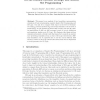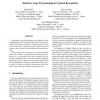197 search results - page 17 / 40 » Reduction Semantics and Formal Analysis of Orc Programs |
FMCAD
2004
Springer
14 years 1 months ago
2004
Springer
Abstract. We relate two well-studied methodologies in deductive verification of operationally modeled sequential programs, namely the use of inductive invariants and clock functio...
WSC
2004
13 years 9 months ago
2004
Computer Automated Multi-Paradigm Modelling (CAMPaM) is an enabler for domain-specific analysis and design. Traffic, a new untimed visual formalism for vehicle traffic networks, i...
PLDI
2012
ACM
11 years 10 months ago
2012
ACM
In this article we present a general method for achieving global static analyzers that are precise, sound, yet also scalable. Our method generalizes the sparse analysis techniques...
JELIA
2004
Springer
14 years 1 months ago
2004
Springer
This paper is an analysis of two knowledge representation extensions of logic programming, namely Answer Set Programming and ID-Logic. Our aim is to compare both logics on the leve...
ICDAR
2009
IEEE
14 years 2 months ago
2009
IEEE
In this paper, we make an attempt to use Inductive Logic Programming (ILP) to automatically learn non trivial descriptions of symbols, based on a formal description. This work is ...


